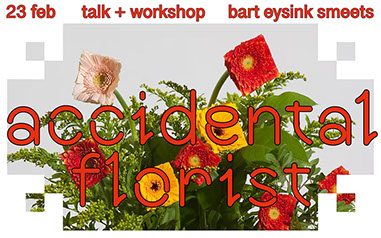MENU
studium resort

save the dates!
23 feb · 23 mar · 20 apr · 18 may · 22 jun · 21 sept · 19 oct · 16 nov · 14 dec
info
location: resort HQ – Nieuwe Sint Jansstraat 35, Groningen
entry: €3,– (free for students)
language: English
accessibility: wheelchair friendly
monday 23 februari, 19:00 – 21:00
talk + workshop: accidental florist
bart eysink smeets
On Monday, February 23, artist Bart Eysink Smeets opens the new season of studium resort with 'accidental florist'. In his work, personal passions such as football, birdwatching, and flower arranging flow naturally and playfully into his practice. What begins as leisure gradually takes shape as art.
Ellis Kat will be in conversation with Bart about his artistic practice. How do these passions influence his work? And when does a hobby become labor, or the other way around? After the conversation, we will get to work ourselves. In a flower-arranging workshop, combined with other hobbies from Bart’s universe, we will work with flowers from the neighborhood. From his perspective as an artist, we will collectively explore where play turns into work, and where work might once again become play.
about
Bart Eysink Smeets (1988) is a visual artist and filmmaker. Through his work, Eysink Smeets amplifies the absurdity of everyday life. A love for simple, strange ideas runs through all of his artistic projects. He once stood with a kitchen on the tidal flats near Terschelling, which disappeared underwater at high tide, and his documentary Bart and the Stone That Went Home was broadcast on NPO2 by VPRO. In the film, he returned a glacial erratic to its place of origin after 200,000 years.
Bart often begins his projects from familiar hobbies. Birdwatching, for example, became an attempt to photograph birds perched on plastic figurines of those same birds, while flower arranging was transformed into a photographic series in which he cut the flowers themselves into squares.
about studium 2026
In 2026, the program of studium resort revolves around the year theme of het resort: I <3 HOBBIES. Almost every month, we invite an artist for an evening where conversations, lectures, workshops and performances flow into one another. Together with the audience, we assemble a new tasting of hobbies each time.
From flower arranging to birdwatching, from football to dungeons & dragons: studium resort explores how personal passions shape artistic practices. When does something stop being a hobby and become work? And what happens when relaxation, play and dedication begin to edge closer to professionalism?
Each evening offers a low-threshold opportunity to try something new and perhaps discover an unexpected fascination.
about the programmer: Ellis Kat
A new year also brings a new program maker. In 2026, Ellis Kat will curate studium resort. Ellis is a curator, writer and moderator. Until 2025, she was director of the art space Nieuw Dakota in Amsterdam. As a freelance curator, she has worked with institutions including the Cobra Museum, Stedelijk Museum Schiedam and Kunstinstituut Melly.
In her exhibitions and programs, Ellis Kat explores the boundaries of what art can be and who it is for. As program maker and moderator of studium resort, she continues this approach by challenging both artists and audiences to look differently - at art, at each other and at the world around us.